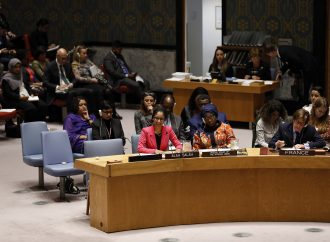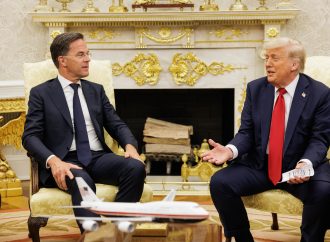On June 17, 2020, Canada will seek election to the United Nations Security Council (UNSC) as one of the ten non-permanent members. If successful, Canada will serve as one of five countries elected this year for a two-year term ending in 2022 and will enjoy a boost in prestige commensurate with having earned a seat at international diplomacy’s top-table. However, facing committed opponents, Ireland and Norway, for the two seats available, Canada’s success is far from guaranteed.
While much of the coverage has focused on the politics of Canada’s pursuit of a UNSC (for example, the potential benefits a seat on the UNSC would have for Canada or how it has influenced Canadian diplomacy in Africa), this article explores the technical side of the process.
Holding “primary responsibility for the maintenance of international peace and security”, the core of the UNSC comprises five permanent members, The US, Russia (which inherited the USSR’s seat in 1991), China, France and the UK. These five members each enjoy veto power over UNSC resolutions and are disproportionately powerful as a result.
However, this is not to say that the remaining ten seats on the UNSC are powerless, nor that the seats themselves are worthless. Rather, membership on the UNSC can confer what Ian Hurd calls a “symbolic legitimacy”. In other words, the UNSC carries a level of importance and status that states can leverage, having won it over others.
Winning a seat can also provide diplomatic access that is otherwise difficult to gain, especially for small states. With 193 members, the UN is a large place, and for those who may want access to senior officials of powerful countries, a seat on the UNSC is an exclusive opportunity for that. States can also have their voices heard on key issues that are important to them and have them placed on the agenda.
The UNSC carries a level of importance and status that states can leverage, having won it over others.
There is also a record of small states being useful on the Council. The P5 do in fact have a veto, but the veto is not the only source of power for the Council. While it is often a major cause of deadlock and a hindrance to productivity, it cannot stop all efforts of other countries. In fact, in order to pass resolutions, votes from elected members are indeed necessary.
Further, there have been many instances in which less powerful states have been able to use their position on the Council to achieve international initiatives, manage humanitarian crises, and broker agreement between P5 members who would otherwise be in disagreement. For example, in 2014, it was Australia that was able to lead the efforts to get the Council to pass Resolution 2166, which condemned the downing of flight MH17 in Eastern Ukraine. With that resolution, Australia’s leadership secured a temporary ceasefire in the area of the crash, independent investigators gained access to the crash site, and remains of the victims allowed to be repatriated.
Recommended: The Rohingya Genocide Is Far from Just a Dispute between The Gambia and Myanmar: Time for Canada to Join
So how does a state win a seat on the UNSC? For the purposes of elections, ten non-permanent seats are divided up between regions of the world: Western Europe and Others, Latin America and the Caribbean, Asia-Pacific, Africa, and Eastern Europe. These regions have only formally existed since 1965, following the passing of Resolution 1991A XVIII in late 1963. Prior to this resolution, informal groupings existed, but maintaining regional representation was a major challenge for the Council. Since 1946, Canada has competed in eight elections, prior to 2020, meaning it has won six and lost two. Canada has been a member of the Council during major global events, including the first Gulf War in the second half of its term in 1990, and the NATO intervention in Kosovo in 1999.
Canada has thus served 6 terms for total of 12 years. Canada is a member of the Western Europe and Others Group (WEOG), which holds two seats, both of which are to be filled in this election. States typically vote by secret ballot in the General Assembly and elections require a 2/3 majority to win. If a 2/3 majority is not reached, then additional rounds of voting can take place. In light of COVID-19, this year’s voting will take place through secret ballots done at a currently unspecified venue with unique time slots for each state. With the secret ballot only a short time away, questions remain about what Canada seeks to get out of Council membership and what it would contribute.
The UNSC has faced significant gridlock in recent months, exacerbated by the COVID-19 pandemic. That said, despite the lowest number of formal decisions in 2019 since 1991 and increased tension amongst the P5, elected members still see the value of a seat and opportunities for themselves. Even in one of the lowest times for the Council, it is important to keep in mind that states can both benefit from Council membership and make a difference in its work.
Even in one of the lowest times for the Council, it is important to keep in mind that states can both benefit from Council membership and make a difference in its work.
Two years is a very short term that states can maximize or waste. There is room for leadership from small states on the UNSC, but in 4 years of campaigning, it is not clear how Canada would take on that leadership. The current pillars of the campaign focus on “working together” for “real change” through five policy areas, but leave much to be desired in terms of how Canada would effectively lead in those areas and what it means to be better at “working together” in an organization riddled with such deep challenges.
Of course, platforms are not the only thing shaping voting. Political and policy positions, past actions on the Council, loyalties, and diplomatic deals come into play. It is difficult to predict how states will vote, as both the international politics of campaigning are complex and voting states also have internal diplomatic politics that can shape their choice. If Canada wins on June 17th, Canadians should ask tough questions about what concrete actions will be taken by their government during the two-year term and pay close attention to actions on the Council. If Canada loses, Canadians should also ask tough questions not about why we lost, rather about whether the uncertainty and lack of clarity in the campaign represents a broader phenomenon within Canadian foreign policy.
Recommended: Did University of Ottawa Grad Students Just Raise US $37 Million in Aid for Afghanistan?









